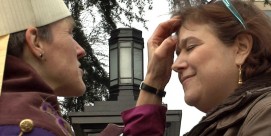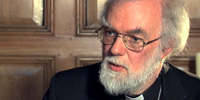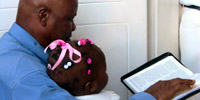In This Episode << SLIDE LEFT TO SEE ADDITIONAL SEGMENTS
Reverend Samuel Scott Colley-Toothaker
Read excerpts from a June 28, 2008 interview with Rev. Samuel Scott Colley-Toothaker, Rector of the Episcopal Church of the Epiphany in Danville, Virginia.

Rev. Samuel Scott Colley-Toothaker |
Q: Define mission in the context in which you understand it.
A: Well, in the simplest of terms, mission for me is doing the work that Christ is calling us to do. I mean we are literally the hands, the feet, the mouth, the eyes, the ears of Christ in this world. If you want to see Christ manifest in the world, stained glass is beautiful and artifacts are beautiful, but really, if you want to see Christ manifest in the world, look to each other. Because it is in those times when the world seems to be falling apart, when the struggles just seem to be overwhelming people, we start to watch people come out of the woodwork, if you will, to express compassion, and love, and support, and are willing to do the work. Katrina would be an example of that, in this country. It was church-based service organizations that really did most of the work after that tragedy struck. So that’s where you see Christ. So mission is actually doing the work that Christ gives us to do. For me that work begins right here within our own parish. We’ll call that in-reach. And if we look just a little bit beyond our walls, we can go to a few streets down and you can see where folks are in need, where there’s depression, where there’s poverty, there’s injustice. So our work is just outside of these walls. And then we expand out, and we look further to our own country, we tend to think of this as a wealthy country, and certainly it is, indeed, but there’s a great deal of poverty and work to be done right here within our borders. And of course, the traditional thought of mission work is foreign mission work. That’s the exciting mission work, to get to go to another country and do that kind of work. So what I believe in terms of a parish, and Epiphany in specific, is that we have work to do on all of those fronts. It’s very easy for us in wealthy countries to write a check and think that we’re supporting mission work, and that’s certainly good and I don’t want to discourage anyone from doing that, but the reality for me is that it’s just as important for us to go out into the field and do the work, get our hands dirty, if you will, as it is for those whom we are serving to receive the help. The reality for me is that the people who go to do the work are the ones who are transformed by the experience perhaps even more than those for whom they’ve gone to serve. And that’s what we hope to build in this place is a spirit and a fire in the belly, if you will, for mission work which allows those who are involved to be transformed and for the experience itself to be transformative for everyone.
Q: Epiphany is opening a new school in the fall. How is that an outreach program and why you think the school is a good idea?
A: This parish has a rich history of starting what I would call audacious projects in this community. One of the things that was clear to me was that this parish, by establishing its major, or what I’ll call core values–that being worship, Christian education and formation, youth ministry and outreach–was looking for a way in which it could grow this parish and serve what we believe is an important need in the community, which is supporting public education by providing it with a bit of competition. So we decided to take on the idea of developing a school, pre kindergarten through 12th grade, over a number of years. Because of the resources that we have here in the parish, we would be able to establish an Episcopal school that is not geared solely to those privileged few who can afford the tuition, but because the parish is endowed and has resources, over the years we will be able to achieve a diversity in that school, not necessarily based on race, but based on economics. We’ll be able to provide either full tuition or supplemental tuition for those who aren’t quite able to pay a full load, and nobody will be priced out of the education that we’re able to give here. The main reason that I’m looking at it is, frankly, mainline churches across the country have had difficulty in attracting new members. I have no illusions about the Episcopal Church, in that its worship services are not necessarily user friendly at first–when to sit, when to stand, when to kneel. So we decided that if we were going to be able to grow this church and continue to preach the gospel of Jesus Christ, then we needed to get people into the door however we could get them through the door. And frankly, if I can’t get young children here on Sundays for a full-blown Christian formation program, then I’m quite willing to take it to them in the educational system.
Q: Let’s talk a little about the politics in the Episcopal Church. Do the policies of the national church and the controversial things like the ordination of a gay bishop affect your church life and mission here?
A: Let me try to approach it from this perspective. It is my experience, just purely anecdotal, by observing those congregations where it seems to be a problem, it seems to be a problem very specifically for the leadership in the congregations. So if the rector is particularly perturbed by that particular issue, then it’s very easy to set a congregation on fire with the same kinds of difficulties. I view those issues in sort of a different way. If we look at the history of the church, matters of theology, doctrine, and dogma have always been a bone of contention, doesn’t matter what it is. Throughout the history of the church, we have always found something to fight about, and those fights generally become so raucous that they lead to schism. That is not, I believe, in keeping in the teaching and the modeling of ministry of Jesus Christ himself gave to us. While Jesus didn’t shrink from theological arguments, by way of example when the Pharisees presented to him the question about the law when the woman was about to be stoned for adultery, Jesus answered that theological question and said you are perfectly within your rights to stone that woman according to the law. But then he offered a little bit of a theological twist and moved it away from the argument of right versus wrong or true versus false to how does this law or how does this theological point connect with relationship? And he did that by asking a question or by giving “Let he who is without sin cast the first stone.” My personal opinions about the theological matters which are currently plaguing the Episcopal Church really are not so much of import if I keep my eye on the ball, which is to lead this congregation in the work that Christ is calling us to, which I don’t believe is judgment, but I believe is love. We are called, as sinners, to love one another, to love one another as Christ has loved us. The rest of it in my mind is something that will be resolved in God’s own good time, and in God’s own good way
Q: The big once-every-ten-year meeting that’s coming up in Canterbury–do you think that whatever happens there will have an impact on what you do here?
A: Absolutely not, absolutely not. Things that might have an impact on us is if the Episcopal Church of the United States decided that it was going to tell us that we needed to begin to bless same-sex unions using the sacrament of marriage. That might be a line that I would draw in the sand. And I would do that because I don’t believe that we do honor to those relationships or do honor to the relationship between a woman and man by using a sacrament which was never intended to bless same-sex unions. Marriage, as I have read it theologically and as we have designed it liturgically, is between a man and a woman. If the church feels that the spirit is moving us in that direction, then I think the church needs to step up and develop a new sacrament which fully honors what it is they are trying to accomplish in that way. So it really depends how things unfold. But no, I don’t think on whole that what goes on, either at the national level or at the Communion level really is going to have an impact on us here.
Q: But in the tradition of the church in this country, if you didn’t bless the unions here, there would be a parish that would be open to blessing same-sex unions elsewhere, and if someone wanted their same-sex union blessed, that’s where they would go.
A: And that’s also the history of the Anglican Church. I mean the via media means that we really do try to find the middle way and that we really are a bridge between the Roman tradition and sort of the more evangelical reform tradition. We straddle both worlds.






